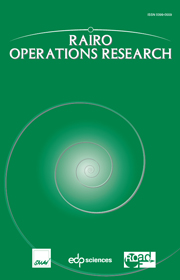Crossref Citations
This article has been cited by the following publications. This list is generated based on data provided by Crossref.
Bui, Alain
1999.
On optimization of continuous-time Markov networks in distributed computing.
Journal of Global Optimization,
Vol. 15,
Issue. 4,
p.
299.
Bui, Alain
Bui, Marc
and
Sohier, Devan
2003.
Innovative Internet Community Systems.
Vol. 2877,
Issue. ,
p.
36.

